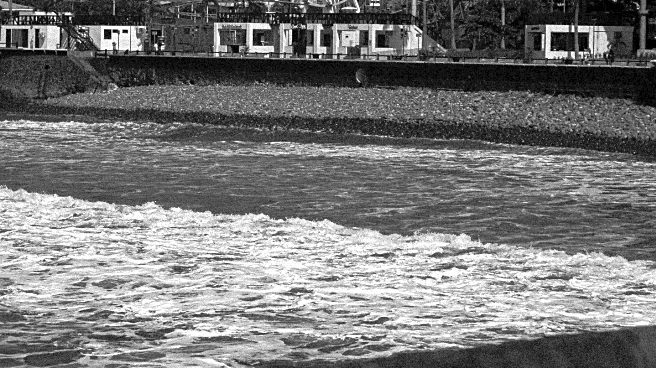What's Happening?
An accident occurred at Coney Beach Pleasure Park in Porthcawl, Bridgend county, resulting in minor injuries to thirteen children and one adult. The incident involved the Wacky Worm ride, described as a small introductory rollercoaster, which derailed on Wednesday evening. Witnesses reported hearing screams and seeing children crying after a cart left the track. Rebecca Eccleston, a visitor at the park, described how a metal railing fell onto her shoulder and pram, narrowly avoiding serious injury to her one-year-old son. South Wales Police instructed the park to clear the site and advised the public to avoid the area. Seven individuals were taken to the hospital for further treatment, and the park remains closed for investigation.
Why It's Important?
The incident highlights safety concerns at amusement parks, particularly those operating older rides. It underscores the need for stringent safety checks and maintenance protocols to prevent accidents. The closure of Coney Beach Pleasure Park, a site with over a century of history, marks a significant change in the local community, as plans for redevelopment into homes, shops, and restaurants are underway. This accident may influence public perception and regulatory scrutiny of amusement park safety standards, potentially leading to more rigorous inspections and safety measures across the industry.
What's Next?
The amusement park will remain closed while South Wales Police and health and safety personnel conduct a thorough investigation. The findings may lead to legal actions or policy changes regarding ride safety and maintenance. The redevelopment plans for the park's site are set to proceed, potentially altering the local landscape and economy. Stakeholders, including local businesses and residents, may react to the changes in community infrastructure and safety regulations.
Beyond the Headlines
The accident raises ethical questions about the responsibility of amusement park operators to ensure the safety of their rides, especially those managed by third parties. It also prompts a cultural reflection on the role of traditional amusement parks in modern society, as redevelopment plans suggest a shift towards commercial and residential spaces. Long-term implications may include changes in leisure activities and community identity as historical sites are repurposed.









